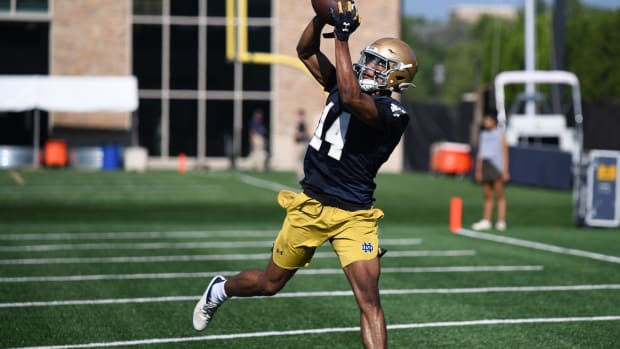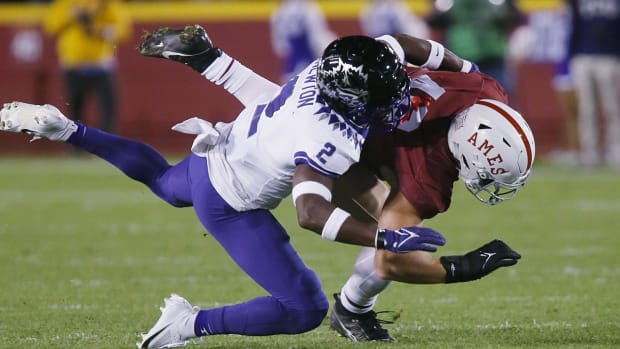The Rules Reconsidered: I Didn’t Interfere with Anything; the Clumsy Bloke Fell
The mother and the father are in the living room; the father is stoking a fire, the mother tapping her iPad. The nana is petting her dog, a two-pound Chihuahua named Molly, deluded unfortunately that she is a great dire wolf (a common affliction among that breed), and our cats lions stalking the premises for blood (this occasionally makes for comical altercations, as the one dog and three felines bark and hiss and slap the glass door while biting air; the Molly seems blithely unaware that glass pane is all that prevents her murder). But it’s 3:30, the game is on, and the family is ready for the Frogs to emerge triumphant over Iowa State and march on to another bowl.
That this happy ending never materialized goes without saying. However, it is painfully apparent to me there is a rule I did not quite reconsider sufficiently, nor, unfortunately, have those loathsome pin-striped heretics we in polite society call referees. Hence, the need for this piece.
I want to offer a white flag to these officious renegades, for their own sake, if not mine, as I do not believe they adequately understand the wrath of the mother. When I was growing up, every Sunday, it was the father who had the habit of screaming at the television, presumably with the belief his cheers and scolds would, like shamanic incantations, transfer through the glass screen and goad the Boys to another touchdown and field goal—needless to say, after 1995, the scolding grew louder and more common, the cheering rarer and more subdued, neither with a discernible effect.
But after I attended TCU, something shifted. The see-saw of the parental passions swayed, and it became the mother who cheered and scolded while the father grew content demurely to mumble. And though Shakespeare died three hundred fifty years before her birth, I’ve no doubt the Bard had the mother in mind when he sagely observed “hell hath no fury . . .” (I shall illuminate the maternal wrath thus: at one point early on in our proceedings against Iowa State, we seemed to give up a turnover, but upon the mother’s objection, the ball fell out of opposing hands; her explanation: “I must have scared it out of ‘em.” Believe me, dear ball, I understand, and thank you, for both our sakes).
So, this piece is intended for referees everywhere: mind you, the Purple Rule, for hell hath no fury like the mother’s scorn.
For those who didn’t see the game: congratulations, I salute you. For those who did, I’m not going to traumatize you a second time. But the relevant play occurred with about five minutes left in the First Quarter, when Quincy Brown caught a clear, fair pass from Max Duggan, which should have increased our momentum down the field and, eventually, into the end zone. When that yellow stain on all life’s joys dimmed the sunlight, we—the mother and I, the father, the nana, even the Molly—were quite pleased that despite the apparent pass interference by Iowa State, Quincy Brown made the play of the game.
Only that’s not how the terribly misguided pinheads saw it.
They indeed called pass interference. And considering I now know what pass interference is, I couldn’t agree more. Except the pinstriped potspoilers thought it clever to add a plot twist.
“Against the offense,” the father interpreted.
“The offense?” I asked, puzzled.
“The offense.”
“But that’s us!” I objected.
“It is.”
“How in the name of Pluto in Hades does the offense commit pass interference?!”
“By pushing the defensive player down.”
And despite the replay clearly showing that particular Cyclone petered out like a springtime breeze in the presence of Mr. Brown’s bulk, the penalty stayed.
“I’m gonna fetch another log for the fire,” the father said, his agony being just too much to take. But the mother . . . be thankful, pinstriped provocateurs, you were not within five hundred miles of her grasp.
So here we are, three weeks since the advent of the Purple Rule, and it seems Horned Frog fans everywhere and those judicial miscreants are at an impasse. But since we all agree that it is not merely one defensive player who can commit pass interference, but presumably anybody, I would like to submit that Iowa State’s punter committed pass interference at least three times—by not placing TCU in a position for Duggan to put the ball in a running back’s hands conveniently near the end zone. I would also like to submit that, considering how many rushing yards Duggan managed, on a broken foot no less, every play in which the poor man had to move farther than the line of scrimmage was attributable to pass interference.
Am I finished? Not hardly. Clearly, the referees committed pass interference. How? By calling pass interference. Honestly! How are a quarterback and receiver to be expected to transfer the ball on fair terms when any defensive player can simply trip, and that yellow flag rear its ugly face? And for that matter, I’d like to submit that the flag itself committed pass interference. The damn thing’s hideous. There’s no way to focus on anything else.
Well. The season is over, the damage done. White flags are nicer than yellow ones. So, I am going to enjoin referees everywhere to study this piece, and the two prior, as many times as are necessary to inculcate in their very marrow the absolute authority of the Purple Rule. For those in the back, who didn’t catch on the last two times, the Purple Rule is simple:
When the opposing team does it, it’s a penalty; when TCU does it, it ain’t.
And that’s the bottom line.
Want to join the discussion? Click here to become a member of the Killer Frogs message board community today!
Follow KillerFrogs on Twitter to stay up to date on all the latest TCU news!





